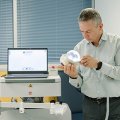
University of Queensland researchers are investigating whether high-intensity interval training can help women quit smoking.
The study seeks female participants aged 18 to 35 years who are willing and ready to make an attempt to quit smoking.
Smoking and physical inactivity are the biggest risk factors for heart disease in women under 35, according to research from the Centre for Research on Exercise, Physical Activity and Health at UQ's School of Human Movement and Nutrition Sciences.
Lead researcher Dr Toby Pavey said there is an urgent need for more effective interventions to help reduce the prevalence of heart disease in women attributable to smoking and physical inactivity.
“As many smokers have said getting fit is a motivation for quitting, linking strategies that encourage quitting and improving fitness could potentially change smoking and exercise behaviours at the same time,” Dr Pavey said.
High-intensity Interval Training involves alternating shorts bursts of high intensity exercise with recovery periods of light exercise in the same session.
Dr Pavey said this is the first study of its kind to look at high-intensity interval training as a potential quit smoking intervention.
“We will be comparing the effects of two different exercise programs, high-intensity interval training and a moderate physical activity program, combined with quit smoking support such as quit packs and Quitline to determine which provides the highest quit rates,” he said.
“The results of the study will improve our understanding of the effects of exercise intensity on helping people quit smoking, and provide evidence for developing innovative and time-efficient interventions for promoting heart health in women.”
Participants will be randomly selected to take part in one of the two exercise programs which will run across a 12 week period.
The first group of participants will undertake 35 minute exercise sessions, three times a week including four, four-minute aerobic intervals at high intensity.
The second group of participants will receive a pedometer with the aim of increasing to at least 10,000 steps a day, and complete a lifestyle log book to record steps and number of cigarettes smoked.
Participants will be tested to measure aerobic fitness, body composition, heart and lung function, and complete questionnaires about the number of cigarettes smoked and withdrawal symptoms.
Participants must smoke at least five cigarettes per day and not be currently using pharmacological quit smoking aids.
Testing and supervised exercise training will be conducted at The University of Queensland at St Lucia, with parking provided.
For more information phone Dr Toby Pavey (+61) 7 3346 9898 or email hiit2quit@uq.edu.au.
Media: Dr Toby Pavey (+61) 7 3346 9898 or t.pavey@uq.edu.au










